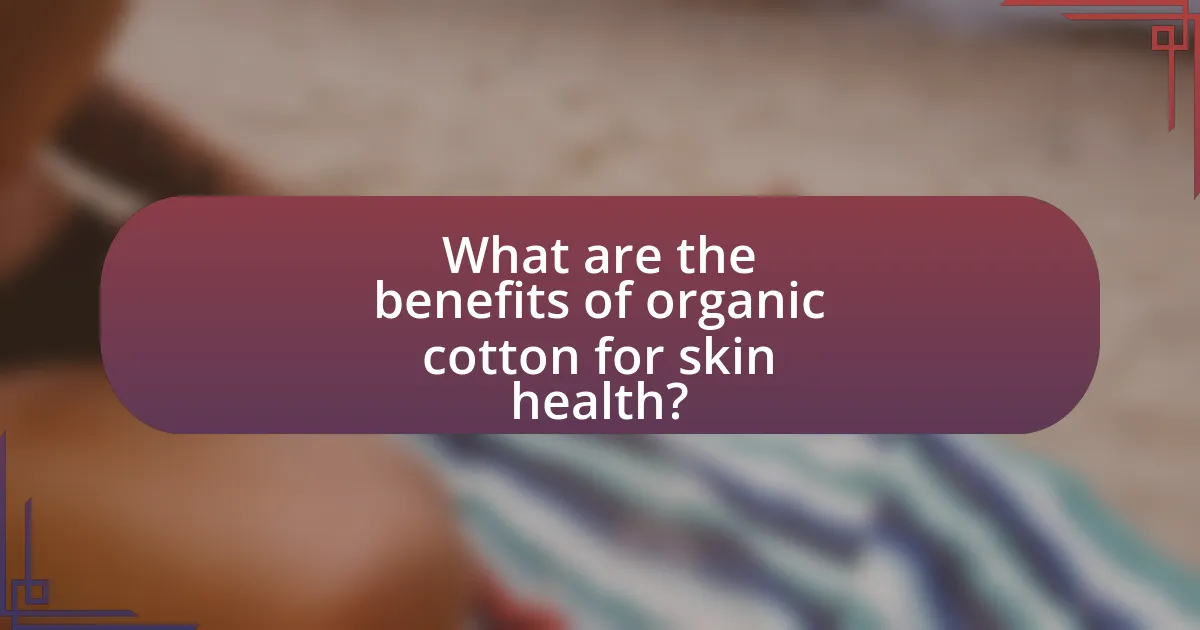Organic cotton is highlighted for its numerous benefits to skin health, primarily due to its hypoallergenic properties and the absence of harmful chemicals found in conventional cotton. This article explores how organic cotton, grown without synthetic pesticides and fertilizers, reduces the risk of skin irritation and allergic reactions, making it a safer choice for individuals with sensitive skin. It also discusses the environmental advantages of organic cotton farming, including reduced water usage and improved soil health, while providing practical tips for consumers on selecting and incorporating organic cotton products into their daily lives.

What are the benefits of organic cotton for skin health?
Organic cotton is beneficial for skin health due to its hypoallergenic properties, which reduce the risk of skin irritation and allergic reactions. Unlike conventional cotton, organic cotton is grown without synthetic pesticides and fertilizers, making it less likely to contain harmful chemicals that can irritate sensitive skin. Additionally, organic cotton is softer and more breathable, which helps to maintain skin moisture and prevent conditions like eczema. Studies have shown that using organic textiles can lead to fewer skin issues, supporting the claim that organic cotton is a healthier choice for those with skin sensitivities.
How does organic cotton differ from conventional cotton?
Organic cotton differs from conventional cotton primarily in its cultivation methods, which avoid synthetic pesticides and fertilizers. Organic cotton is grown using natural farming practices that promote biodiversity and soil health, while conventional cotton often relies on chemical inputs that can harm the environment and human health. According to the Global Organic Textile Standard (GOTS), organic cotton must meet strict criteria, including the prohibition of toxic chemicals, which supports safer production processes and reduces the risk of skin irritation for consumers.
What are the chemical differences between organic and conventional cotton?
Organic cotton is produced without synthetic pesticides, herbicides, or fertilizers, while conventional cotton often relies on these chemicals for growth and pest control. The absence of these harmful substances in organic cotton results in lower levels of chemical residues, making it safer for skin contact. Studies indicate that conventional cotton farming uses approximately 16% of the world’s insecticides and 7% of pesticides, which can lead to skin irritation and allergic reactions in sensitive individuals. In contrast, organic cotton farming practices promote biodiversity and soil health, further reducing chemical exposure.
How do these differences impact skin health?
The differences in organic cotton compared to conventional cotton significantly enhance skin health. Organic cotton is grown without harmful pesticides and chemicals, reducing the risk of skin irritation and allergic reactions. Studies indicate that individuals with sensitive skin experience fewer adverse reactions when using organic cotton products, as these materials are less likely to contain residues that can exacerbate skin conditions. Additionally, organic cotton is often softer and more breathable, promoting better moisture management and reducing the likelihood of skin issues such as rashes or infections.
Why is organic cotton considered hypoallergenic?
Organic cotton is considered hypoallergenic because it is grown without synthetic pesticides and fertilizers, which can irritate sensitive skin. The absence of these chemicals reduces the likelihood of allergic reactions, making organic cotton a safer choice for individuals with allergies or skin sensitivities. Studies have shown that conventional cotton farming often involves the use of harsh chemicals that can remain in the fabric, whereas organic cotton is processed with fewer harmful substances, further minimizing potential allergens.
What allergens are commonly found in conventional cotton products?
Conventional cotton products commonly contain allergens such as pesticides, herbicides, and chemical residues from processing. These substances can trigger allergic reactions in sensitive individuals. For instance, cotton is often treated with chemicals like formaldehyde and various dyes, which can cause skin irritation and allergic responses. Studies have shown that exposure to these chemicals can lead to dermatitis and other allergic conditions, highlighting the importance of considering organic cotton alternatives that are free from such harmful substances.
How does organic cotton reduce the risk of skin irritation?
Organic cotton reduces the risk of skin irritation due to its cultivation without synthetic pesticides and fertilizers, which can leave harmful residues. The absence of these chemicals minimizes the likelihood of allergic reactions and sensitivities in individuals with delicate skin. Additionally, organic cotton is often processed with fewer harsh chemicals, further decreasing the potential for skin irritation. Studies indicate that organic cotton products are less likely to provoke skin issues compared to conventional cotton, making them a safer choice for sensitive skin types.
What are the environmental benefits of using organic cotton?
Using organic cotton provides significant environmental benefits, primarily through reduced pesticide and chemical usage. Organic cotton farming avoids synthetic fertilizers and pesticides, which can contaminate soil and water, leading to biodiversity loss. According to the Organic Trade Association, organic cotton farming uses 91% less water than conventional methods, contributing to water conservation. Additionally, organic practices enhance soil health by promoting natural ecosystems, which can sequester carbon and reduce greenhouse gas emissions. These practices collectively support sustainable agriculture and protect the environment.
How does organic cotton farming affect soil health?
Organic cotton farming enhances soil health by promoting biodiversity and improving soil structure. This farming method utilizes natural fertilizers and pest control, which reduces chemical runoff and enhances microbial activity in the soil. Studies indicate that organic farming practices can increase soil organic matter by 20-30%, leading to improved nutrient retention and water-holding capacity. Additionally, organic cotton farming often incorporates crop rotation and cover cropping, which further enriches the soil ecosystem and prevents erosion. These practices contribute to a healthier soil environment, supporting sustainable agriculture and long-term soil fertility.
What impact does organic cotton have on water usage and pollution?
Organic cotton significantly reduces water usage and pollution compared to conventional cotton. It requires approximately 91% less water due to its cultivation methods, which focus on rain-fed irrigation rather than synthetic fertilizers and pesticides. This reduction in water usage leads to less runoff of harmful chemicals into waterways, thereby decreasing water pollution. Studies indicate that organic farming practices enhance soil health and biodiversity, further contributing to a cleaner environment.
How can organic cotton improve overall skin health?
Organic cotton can improve overall skin health by being free from harmful chemicals and pesticides, which reduces the risk of skin irritation and allergic reactions. Unlike conventional cotton, organic cotton is grown without synthetic fertilizers and toxic substances, making it gentler on the skin. Studies have shown that organic cotton fabrics can help maintain skin hydration and reduce inflammation, contributing to healthier skin. For instance, a study published in the Journal of Dermatological Science found that organic cotton clothing significantly decreased skin irritation in individuals with sensitive skin.
What are the moisturizing properties of organic cotton?
Organic cotton has inherent moisturizing properties due to its natural fibers, which allow for better moisture retention and breathability compared to conventional cotton. The structure of organic cotton fibers helps to absorb moisture without feeling damp, promoting a comfortable skin environment. Additionally, organic cotton is free from harmful chemicals and pesticides, which can irritate the skin and disrupt its natural moisture balance. This makes organic cotton a suitable choice for individuals with sensitive skin, as it helps maintain hydration while minimizing the risk of allergic reactions or irritation.
How does organic cotton help in regulating body temperature?
Organic cotton helps in regulating body temperature due to its natural breathability and moisture-wicking properties. The fibers of organic cotton allow air to circulate, which helps to keep the body cool in warm conditions. Additionally, organic cotton can absorb moisture without feeling damp, allowing sweat to evaporate quickly, thus maintaining a comfortable body temperature. Studies have shown that natural fibers like organic cotton can enhance thermal comfort by reducing heat retention compared to synthetic materials.
What types of products are available made from organic cotton?
Products made from organic cotton include clothing items such as t-shirts, dresses, and underwear, as well as home textiles like bed sheets, towels, and curtains. Organic cotton is cultivated without synthetic pesticides or fertilizers, making it a healthier choice for both consumers and the environment. The Global Organic Textile Standard (GOTS) certifies organic cotton products, ensuring they meet strict ecological and social criteria, which reinforces the credibility of these products in promoting skin health and reducing exposure to harmful chemicals.
Which clothing items are best for sensitive skin?
Clothing items best for sensitive skin include those made from organic cotton, bamboo, and linen. Organic cotton is particularly beneficial as it is free from harmful chemicals and pesticides, reducing the risk of skin irritation. Studies have shown that organic cotton is softer and more breathable than conventional cotton, making it ideal for individuals with sensitivities. Bamboo fabric possesses natural antibacterial properties and is hypoallergenic, further minimizing the likelihood of skin reactions. Linen, known for its moisture-wicking abilities, also provides comfort and reduces friction against the skin.
What home textiles can benefit skin health?
Home textiles that can benefit skin health include organic cotton bedding, towels, and clothing. Organic cotton is grown without harmful pesticides and chemicals, making it less likely to irritate sensitive skin. Studies have shown that organic cotton textiles can reduce skin allergies and improve overall skin comfort due to their breathability and hypoallergenic properties. Additionally, organic cotton is known for its softness, which can enhance skin health by minimizing friction and irritation during sleep or daily use.
How can consumers choose the best organic cotton products?
Consumers can choose the best organic cotton products by looking for certifications such as GOTS (Global Organic Textile Standard) or OEKO-TEX, which ensure that the cotton is grown without harmful chemicals and processed in an environmentally friendly manner. Additionally, consumers should check for product transparency, including information about the sourcing and manufacturing processes, as well as the presence of any harmful dyes or finishes. Research indicates that organic cotton is less likely to cause skin irritation due to the absence of synthetic pesticides and fertilizers, making it a healthier choice for sensitive skin.
What certifications should consumers look for in organic cotton products?
Consumers should look for certifications such as Global Organic Textile Standard (GOTS), Organic Content Standard (OCS), and USDA Organic when purchasing organic cotton products. GOTS ensures that textiles are made from at least 70% organic fibers and adheres to strict environmental and social criteria throughout the supply chain. OCS verifies the organic status of the cotton and tracks it from the source to the final product, while USDA Organic certification guarantees that the cotton is grown without synthetic fertilizers or pesticides. These certifications provide assurance of the product’s organic integrity and commitment to sustainable practices.
How can consumers ensure they are purchasing truly organic cotton?
Consumers can ensure they are purchasing truly organic cotton by looking for certifications from recognized organizations such as the Global Organic Textile Standard (GOTS) or the Organic Content Standard (OCS). These certifications guarantee that the cotton is grown without synthetic pesticides or fertilizers and meets specific environmental and social criteria. Additionally, consumers should check product labels and ask retailers for information about the sourcing and production processes to confirm the authenticity of organic claims.
What are some practical tips for incorporating organic cotton into daily life?
Incorporating organic cotton into daily life can be achieved through several practical steps. First, choose organic cotton clothing, such as t-shirts, underwear, and pajamas, which are free from harmful chemicals and pesticides, promoting better skin health. Second, opt for organic cotton bedding and towels, as these products are softer and less likely to irritate sensitive skin. Third, consider using organic cotton reusable bags for shopping, reducing plastic waste while supporting sustainable practices. Additionally, select organic cotton baby products, like diapers and clothing, to ensure the safety and comfort of infants. Research indicates that organic cotton is grown without synthetic fertilizers and pesticides, making it a healthier choice for both the environment and human health.





